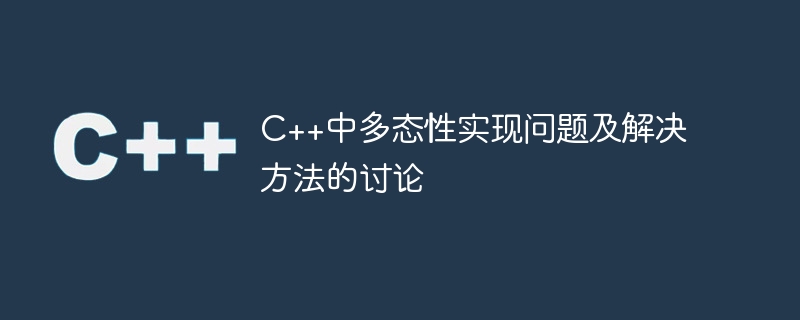

Discussion on polymorphism implementation issues and solutions in C
Polymorphism is a very important feature in the C language, which makes objects of a class Can exhibit different behaviors depending on its specific type. However, in actual applications, we sometimes encounter some problems, especially in the use scenarios of multiple inheritance and virtual destructors.
1. Implementation of polymorphism
In C, polymorphism can be achieved through virtual functions and pure virtual functions. A virtual function is defined in the base class and declared through the keyword "virtual". Subclasses can override this function to implement specific behaviors. Pure virtual functions are only declared in the base class without specific implementation. Subclasses must override this function.
#include <iostream>
using namespace std;
class Animal {
public:
virtual void sound() {
cout << "动物发出声音" << endl;
}
};
class Cat : public Animal {
public:
void sound() {
cout << "猫咪发出喵喵声" << endl;
}
};
class Dog : public Animal {
public:
void sound() {
cout << "狗狗发出汪汪声" << endl;
}
};
int main() {
Animal *animal1 = new Cat;
Animal *animal2 = new Dog;
animal1->sound(); // 输出:猫咪发出喵喵声
animal2->sound(); // 输出:狗狗发出汪汪声
return 0;
}In the above code, Animal is the base class, and Cat and Dog are derived classes. By defining the virtual function sound(), the effect of polymorphism is achieved. At runtime, by declaring the base class pointer to point to the derived class object, the sound() function of the subclass is called.
2. Problems caused by multiple inheritance
C supports multiple inheritance, that is, a derived class can inherit from multiple base classes at the same time. However, multiple inheritance can lead to ambiguity in function calls.
#include <iostream>
using namespace std;
class Animal {
public:
virtual void sound() {
cout << "动物发出声音" << endl;
}
};
class Cat : public Animal {
public:
void sound() {
cout << "猫咪发出喵喵声" << endl;
}
};
class Dog : public Animal {
public:
void sound() {
cout << "狗狗发出汪汪声" << endl;
}
};
class CatDog : public Cat, public Dog {
};
int main() {
CatDog catdog;
catdog.sound(); // 编译错误,二义性函数调用
return 0;
}In the above example, we defined a class named CatDog, which inherits from both Cat and Dog classes. When we call catdog.sound(), an ambiguity error occurs because both Cat and Dog have their own sound() functions. To solve this problem, we can specify which base class function to use through scope qualifiers.
#include <iostream>
using namespace std;
class Animal {
public:
virtual void sound() {
cout << "动物发出声音" << endl;
}
};
class Cat : public Animal {
public:
void sound() {
cout << "猫咪发出喵喵声" << endl;
}
};
class Dog : public Animal {
public:
void sound() {
cout << "狗狗发出汪汪声" << endl;
}
};
class CatDog : public Cat, public Dog {
};
int main() {
CatDog catdog;
catdog.Cat::sound(); // 输出:猫咪发出喵喵声
catdog.Dog::sound(); // 输出:狗狗发出汪汪声
return 0;
}In the above code, we use the scope qualifier to call the sound() function of the specified base class to avoid ambiguity problems.
3. The use of virtual destructors
In the inheritance relationship of C, if the destructor of the base class is not declared as a virtual function, it may cause the problem that the derived class is not released correctly.
#include <iostream>
using namespace std;
class Base {
public:
Base() {
cout << "调用基类的构造函数" << endl;
}
~Base() {
cout << "调用基类的析构函数" << endl;
}
};
class Derived : public Base {
public:
Derived() {
cout << "调用派生类的构造函数" << endl;
}
~Derived() {
cout << "调用派生类的析构函数" << endl;
}
};
int main() {
Base *baseptr = new Derived;
delete baseptr;
return 0;
}In the above example, the destructor of the base class Base is not defined as a virtual function. When we delete a derived class object through a base class pointer, only the destructor of the base class Base will be called, not the destructor of the derived class Derived. To solve this problem, the destructor of the base class needs to be declared as a virtual function.
#include <iostream>
using namespace std;
class Base {
public:
Base() {
cout << "调用基类的构造函数" << endl;
}
virtual ~Base() {
cout << "调用基类的析构函数" << endl;
}
};
class Derived : public Base {
public:
Derived() {
cout << "调用派生类的构造函数" << endl;
}
~Derived() {
cout << "调用派生类的析构函数" << endl;
}
};
int main() {
Base *baseptr = new Derived;
delete baseptr;
return 0;
}In the above example, we declare the destructor of the base class as a virtual function, so that when deleting the derived class object through the base class pointer, the destructor of the derived class will be called first, and then the base class will be called. The destructor of a class ensures that the object is released correctly.
To sum up, polymorphism is a powerful feature in C and can be achieved through virtual functions and pure virtual functions. When encountering problems with multiple inheritance and virtual destructors, we can solve them through scope qualifiers and virtual function declarations. In practical applications, the rational use of polymorphism can improve the readability and flexibility of code and bring convenience to software development.
The above is the detailed content of Discussion of polymorphism implementation issues and solutions in C++. For more information, please follow other related articles on the PHP Chinese website!




